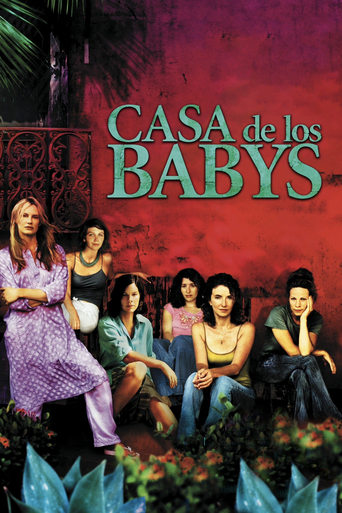Whitech
It is not only a funny movie, but it allows a great amount of joy for anyone who watches it.
Merolliv
I really wanted to like this movie. I feel terribly cynical trashing it, and that's why I'm giving it a middling 5. Actually, I'm giving it a 5 because there were some superb performances.
Nayan Gough
A great movie, one of the best of this year. There was a bit of confusion at one point in the plot, but nothing serious.
Philippa
All of these films share one commonality, that being a kind of emotional center that humanizes a cast of monsters.
kal-17
Desperate American women, unable to bear children, wait for months at a hotel in Mexico, in order to adopt babies. Meanwhile, homeless and apparently parent less or unwanted children sleep in cardboard shelters and roam the streets, stealing and washing windows for survival, while one young woman reminisces about the baby she gave up, and another, pregnant and 15 years old, is on the path to giving up her baby.This is a very affecting movie. It presents the situation, prompts us to ask the questions, but there are no answers.The characters were interesting, and the performances are compelling. Rita Moreno, especially, was wonderful as the hotel owner.
k_barra
I enjoy Sayles because he always gives you more than you expect. This film is about 6 women trying to adopt children from Mexico, but it is also a commentary on many aspects of a life we, as Americans, may never understand. One plot line is that of the young maid at the hotel who is raising her 2 younger siblings, and has given her own child up for adoption. Another plot details the lives of 3 brothers who talk about their mother, but appear to live alone on the streets, huffing spray paint and sleeping on the beach. Still another plot involves the son of the hotel owner, who is convinced that the adoption of Mexican babies by Americans is imperialism at its peak. His mother, who owns the hotel, reveals her feelings when she talks about how easily men get caught up in politics; her own husband is banned from the state and has taken up with a young Spanish girl, leaving her to run the hotel and adoption service by herself. Meanwhile, the viewer finds out the motivation of each woman who is seeking to adopt. The women are somewhat catty and mean, but are under a lot of stress as they have been in Mexico for 2 months already. All in all, a wonderful film. Sayles offers a true, if not depressing, view of life in Mexico, especially for women. This life is in sharp contrast with the woes of the American women, and it really makes you think about our lives here.
guyb
I have been a huge fan of John Sayes for a number of years. I think of him as one of the very best directors. I've managed to track down every single movie he's done. I anxiously await each new one he does every two years. This time I was very angry and disappointed. On the Special Features on the DVD, Sayes tells us how he has spent so much time in South America and really "knows" the people. Yet his political perspective on the international adoption process is extremely one sided and very anti-adoption. Seems like he just met the "Che Guevera" segment of South America (the gringos are stealing our babies). This is a uniquely bad experience for me from all his movies. I always felt that I had a total experience from each one of them; not just one extreme point of view. From a cinematography and acting point of view, the movie was good, but not quite up to Sayes greatness.
jdesando
John Sayles' `Casa de los Babys' is a strange film, even for the eccentric director of such art-house favorites as `Matewan' and `Lone Star.' Strange because I can't tell where he's coming from: Does his film show in typically oblique Sayles' fashion the exploitation of women waiting to adopt children from Latin America? Or is it homage to the industry that delivers babies to needy gringo women?Or is his juxtaposition of scenes with waiting-moms and the careless promiscuity of Latino youths producing unwanted babies transcending this locale into the human irony of those who can't have and those who carelessly have.Probably both, although it is hard to sympathize with the Marcia Gay-Harden character, who lies and steals toiletries from the maid's cart and exhibits questionable activity with the dolls she uses to practice for motherhood. Her ''Believe me, you don't want my husband to have to come down here!'' exclamation is chilling because you know she can cause the trouble.
Darryl Hannah's athletic, masseuse mom is the most memorable as her loss of 3 children after childbirth is slowly revealed to a skeptical flock of waiting mom wanabees. Susan Lynch's Irish girl has a soulful exchange with a Latina maid that is poignant because neither understands the other's language, but each clearly understands the longing for motherhood.With little climactic activity and too many separate actions and characters, the story could almost be a faux documentary, and its theme is just about as buried as a well-done news piece from CNN. Although it is not the obviously political `Sunshine State,' it carries weight about the two cultures, which serve each other. Again the Harden character offers the jaundiced point of view: "They're making us pay for our babies with the balance of trade."It is possible Sayles is praising women who wait so long and so promisingly for someone else's children. Shakespeare says it succinctly: `Let her never nurse her child herself, for she will breed it like a fool.'

